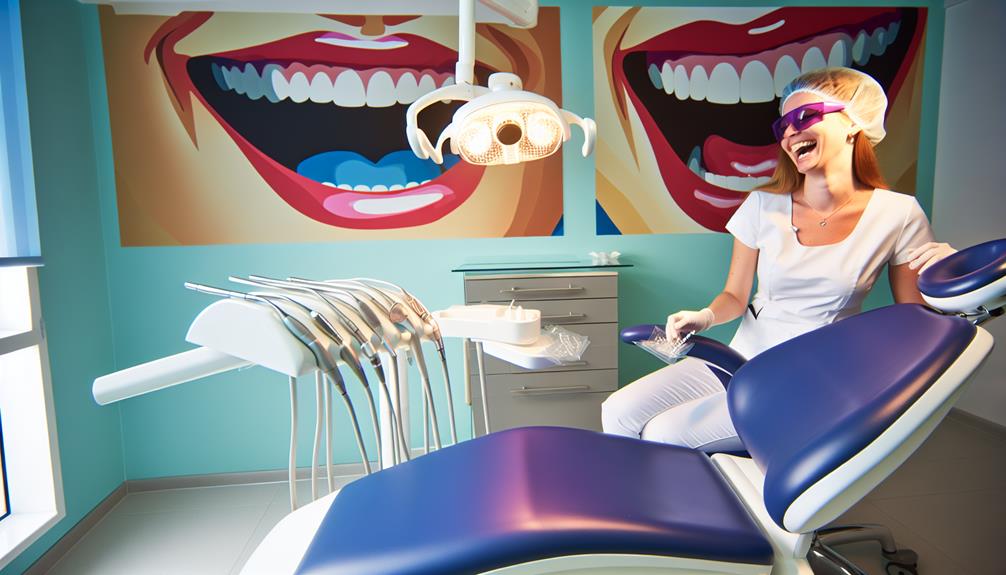Teeth whitening at the dentist varies in cost, typically ranging from $200 for take-home kits to $1,200 for in-office treatments. In-office procedures offer immediate results that can last from six months to two years, while at-home kits provide a more budget-friendly option with results lasting three months to a year. The investment often proves worthwhile, as professional whitening is generally safer, more effective, and offers longer-lasting results compared to over-the-counter alternatives. Additional factors, such as geographic location and dental office reputation, can influence pricing and overall effectiveness. Further insights on treatment options and their benefits are available.
Key Takeaways
- In-office teeth whitening costs range from $500 to $1,200, offering immediate and significant results compared to at-home options.
- Professional whitening provides longer-lasting effects, typically lasting from 6 months to 3 years, depending on the treatment chosen.
- Dental professionals ensure safety and minimize risks, reducing sensitivity issues associated with higher concentrations of bleaching agents.
- Customized treatment plans address individual needs, enhancing effectiveness and overall satisfaction with the results.
- Despite the higher cost, the superior results and safety of professional whitening often justify the investment for many patients.
Types of Teeth Whitening Procedures
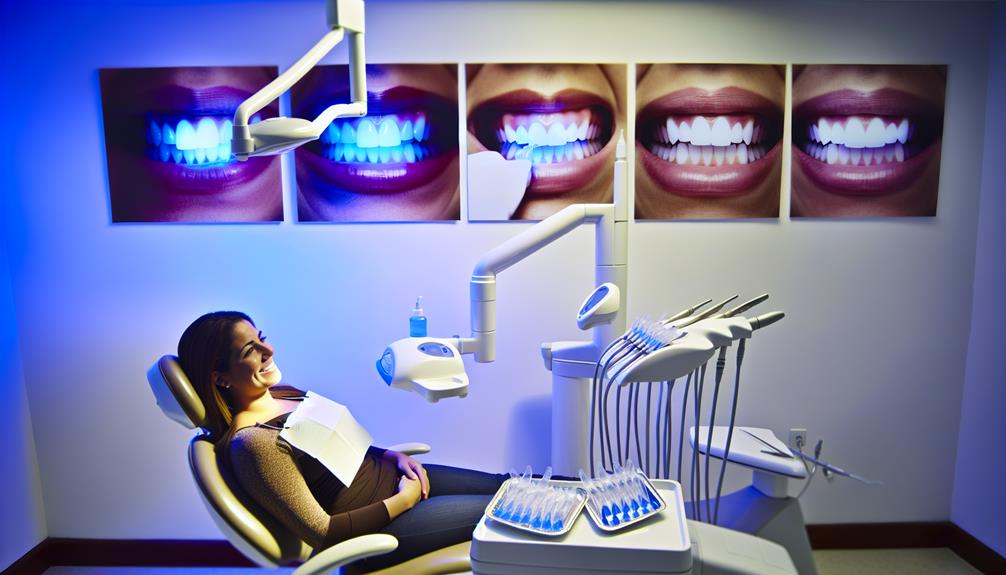
When it comes to enhancing the aesthetics of one's smile, various types of teeth whitening procedures are available at dental practices. Among the most popular methods is in-office bleaching, which involves the application of a high-concentration whitening agent directly to the teeth by a dental professional. This method often yields immediate results, making it a favored choice for those seeking quick transformations. It's important to take into account that, just like managing grief, the journey to a brighter smile can involve emotional challenges and personal preferences, and there are effective strategies for healing that can guide you through the process.
Another advanced option is laser whitening, wherein a laser is used to activate the whitening gel applied to the teeth. This procedure not only accelerates the whitening process but also provides more uniform results, appealing to patients desiring a flawless smile.
For individuals preferring a more personalized approach, custom trays are available. These trays are specially molded to fit an individual's teeth and are used in conjunction with professional-grade whitening gels. This method allows for greater flexibility and comfort, as patients can whiten their teeth at home while maintaining control over the process.
Cost Breakdown of Professional Whitening
Understanding the cost breakdown of professional teeth whitening is vital for individuals contemplating this investment in their smile. Professional whitening options vary, and understanding these differences can help patients make informed choices.
| Whitening Option | Average Cost | Duration of Results |
|---|---|---|
| In-Office Whitening | $500 – $1,200 | 6 months to 2 years |
| Take-Home Kits | $200 – $400 | 3 months to 1 year |
| Combination Treatments | $600 – $1,500 | 1 year to 3 years |
| Maintenance Treatments | $100 – $300 | Varies with frequency |
Pricing comparisons reveal that in-office treatments typically offer immediate results and longer-lasting whiteness compared to take-home kits. However, individuals seeking a more budget-friendly option may find that take-home kits provide satisfactory results at a lower cost. It's important to evaluate both the initial investment and the long-term benefits when assessing these whitening options. Ultimately, the right choice will depend on personal preferences and specific dental needs, reinforcing the significance of consulting with a dental professional to determine the best approach for achieving a brighter smile.
Factors Influencing Whitening Costs
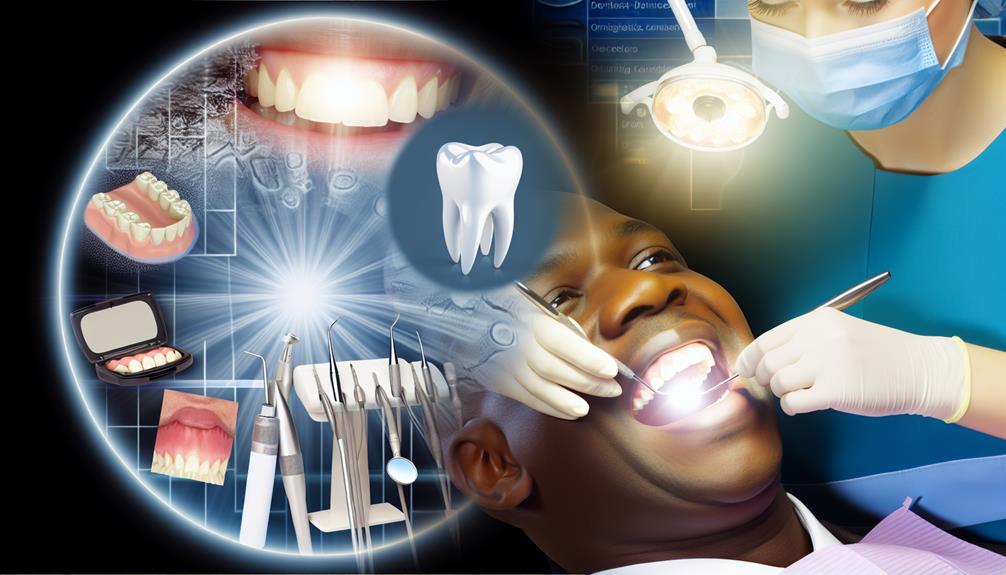
The cost of teeth whitening at the dentist can be greatly influenced by several key factors. The type of treatment selected, whether in-office or at-home options, plays a vital role in determining price. Additionally, geographic location and the reputation of the dental office can further affect the overall expense of whitening services. It's important to stay positive and proactive during this decision-making process, as it can be an emotional journey akin to maneuvering through other life changes, such as job changes or relocations. Understanding the emotional journey of changes can help you approach your teeth whitening experience with confidence.
Treatment Type Selection
Selecting the appropriate teeth whitening treatment involves several key factors that can greatly influence overall costs. Understanding these factors helps patients make informed choices that align with their preferences and budget while ensuring treatment effectiveness.
The type of whitening treatment chosen can considerably impact the overall price. In-office procedures typically offer faster results but may come at a higher cost compared to take-home kits. Additionally, patient preferences regarding the level of involvement in the whitening process can also guide the decision-making process.
Here's a breakdown of common treatment types and associated factors:
| Treatment Type | Cost Influencing Factors |
|---|---|
| In-Office Whitening | Treatment effectiveness, time commitment |
| At-Home Kits | Product quality, patient compliance |
| Combination Approach | Overall satisfaction, long-term results |
Geographic Location Impact
Geographic location plays a significant role in determining the costs associated with teeth whitening treatments. Urban areas typically experience higher pricing due to increased operational costs for dental practices and a greater concentration of patients seeking cosmetic enhancements. As demand for these services escalates in metropolitan regions, dental offices often adjust their pricing strategies to reflect the urban pricing dynamics.
Conversely, rural or less populated regions may offer more competitive rates, influenced by lower overhead expenses and a different patient demographic. In these areas, regional demand can dictate pricing; if fewer individuals seek teeth whitening treatments, dental professionals may lower their costs to attract clients.
Moreover, local economic factors, such as average income levels and the presence of alternative cosmetic options, can further influence pricing structures. Patients in higher-income brackets, commonly found in urban settings, may be more willing to invest in premium whitening services, allowing dentists to maintain elevated prices. Understanding these geographic nuances can empower individuals to make informed decisions about pursuing teeth whitening treatments, ensuring they receive both quality care and value for their investment.
Dental Office Reputation
Dental offices' reputations greatly influence the costs associated with teeth whitening treatments. A well-regarded dental practice often commands higher fees, reflecting its commitment to quality care and effective results. This reputation is cultivated through a combination of factors, including patient reviews and dentist qualifications.
Patient reviews serve as a critical barometer for evaluating a dental office's credibility. Positive testimonials from satisfied patients can enhance a practice's standing in the community, whereas negative feedback may deter potential clients and impact pricing strategies. When patients perceive a dental office as reputable and trustworthy, they are often willing to pay a premium for services, including teeth whitening.
Additionally, dentist qualifications play an essential role in establishing a dental office's reputation. Dentists with advanced training and credentials in cosmetic dentistry are more likely to attract clients seeking high-quality whitening treatments. Their expertise guarantees that patients receive safe, effective procedures, which can justify higher costs.
Ultimately, the reputation of a dental office is an important consideration for patients seeking teeth whitening treatments, as it directly correlates with the quality of care received and the overall cost of the service.
Benefits of Professional Whitening
Professional teeth whitening offers significant advantages, primarily through enhanced whitening results that are often more effective than over-the-counter options. Additionally, the procedure is conducted in a safe and supervised environment, minimizing the risk of complications and ensuring ideal outcomes. This is particularly important as some treatments may cause temporary discomfort or sensitivity, similar to how certain medications like fluoxetine can affect sleep the potential effects of fluoxetine. These benefits underscore the value of seeking professional care for achieving a brighter smile.
Enhanced Whitening Results
One of the primary advantages of undergoing teeth whitening at a dental office is the enhanced results that patients can achieve compared to over-the-counter alternatives. Professional whitening offers a level of brightness that is often unattainable at home, thanks to the advanced whitening technology employed by dental professionals. These treatments not only brighten teeth more effectively but also guarantee a more uniform shade across the entire smile.
Here are three benefits of enhanced whitening results through professional treatments:
- Customized Treatment Plans: Dentists assess individual needs and tailor the whitening process to guarantee peak results, taking into account tooth sensitivity and existing dental work.
- Stronger Whitening Agents: Dental offices utilize higher concentrations of whitening agents that are more effective in breaking down stains, leading to significant improvements in teeth color.
- Long-lasting Effects: Professional whitening treatments often yield results that last longer than those achieved with at-home products, making it a worthwhile investment for enduring brightness.
Safe and Supervised Procedure
Achieving enhanced whitening results is only part of the equation when considering teeth whitening options; safety and supervision during the procedure are equally important. Professional teeth whitening at a dental office adheres to stringent safety protocols designed to protect patients throughout the process.
Dentists are trained to assess individual needs and guarantee that the chosen whitening method is both effective and safe. This tailored approach minimizes potential side effects such as tooth sensitivity or gum irritation, which can occur with over-the-counter products. During the procedure, patient supervision is paramount. A dentist or dental hygienist is present to monitor the application of whitening agents, guaranteeing that they are used correctly and for the appropriate duration.
Moreover, professional whitening treatments utilize higher concentrations of bleaching agents that can provide more significant results than at-home options. However, these agents are administered under controlled conditions, reducing risks associated with misuse. By choosing a dentist for teeth whitening, patients not only achieve a brighter smile but also benefit from a safe, supervised environment that prioritizes their oral health and well-being. This commitment to safety guarantees a rewarding experience, fostering trust and satisfaction in dental care.
At-Home vs. In-Office Options
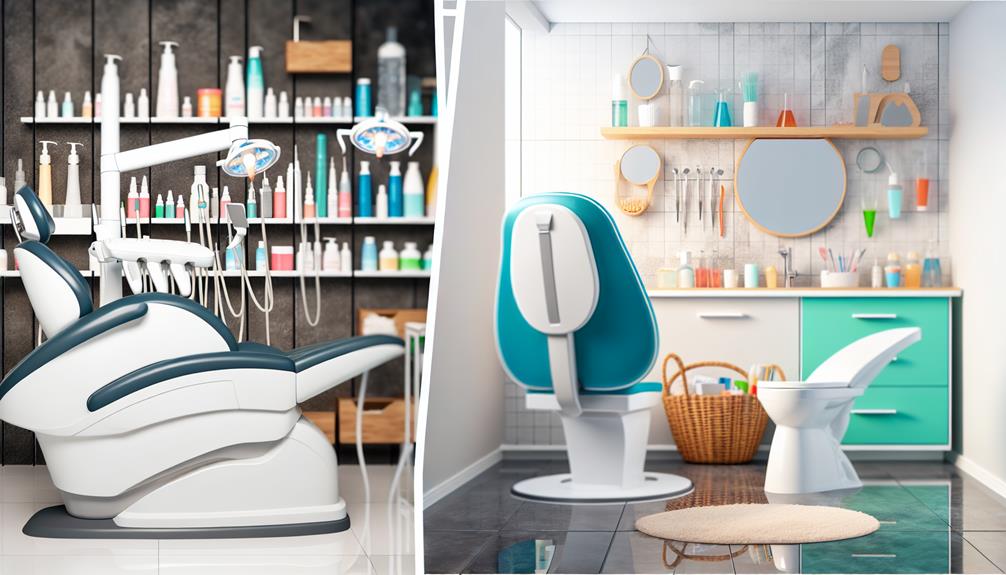
When considering teeth whitening, patients often face the choice between at-home treatments and in-office procedures, each offering distinct advantages and limitations. At-home kits, such as whitening strips and trays, provide convenience and flexibility, allowing individuals to whiten their teeth at their own pace. However, these options may result in less dramatic results compared to professional treatments and can sometimes lead to sensitivity concerns, which can be exacerbated by how stress affects your immune system. In-office whitening, conducted by a dental professional, typically yields faster and more noticeable results due to the use of stronger bleaching agents and advanced technology. While this option is generally more expensive, it guarantees a higher level of safety and effectiveness.
Here are three key considerations when choosing between at-home and in-office whitening options:
- Effectiveness: In-office treatments often provide immediate and more significant results compared to at-home kits.
- Cost: At-home kits tend to be more affordable, while in-office procedures require a higher financial investment.
- Sensitivity Risks: At-home remedies may lead to increased sensitivity for some users, while in-office options are monitored by professionals to mitigate these concerns.
Ultimately, the choice depends on individual preferences, budget, and desired outcomes.
Potential Risks and Side Effects
Despite the effectiveness of teeth whitening treatments, both at-home and in-office procedures carry potential risks and side effects that patients should be aware of before making a decision. One common concern is sensitivity issues, as many individuals experience heightened tooth sensitivity during and after the whitening process. This discomfort may manifest as a sharp pain when consuming hot or cold foods and beverages, typically subsiding after a few days. It's important for patients to recognize and understand these intense emotions surrounding their discomfort, as navigating intense emotions can contribute to a better overall experience.
Additionally, some patients may encounter uneven results, where certain areas of the teeth appear whiter than others, leading to an unsatisfactory aesthetic outcome. Another consideration involves the long-term effects of teeth whitening agents, particularly those containing bleach. Prolonged or excessive use may lead to enamel erosion, compromising the structural integrity of teeth and potentially increasing the risk of cavities.
Furthermore, individuals with pre-existing dental conditions, such as gum disease or cavities, should consult their dentist before pursuing whitening treatments, as these conditions can exacerbate sensitivity and other side effects. Understanding these potential risks enables patients to make informed choices about their oral health and aesthetic goals, fostering a sense of community through shared knowledge and experience.
Is It Worth the Investment?
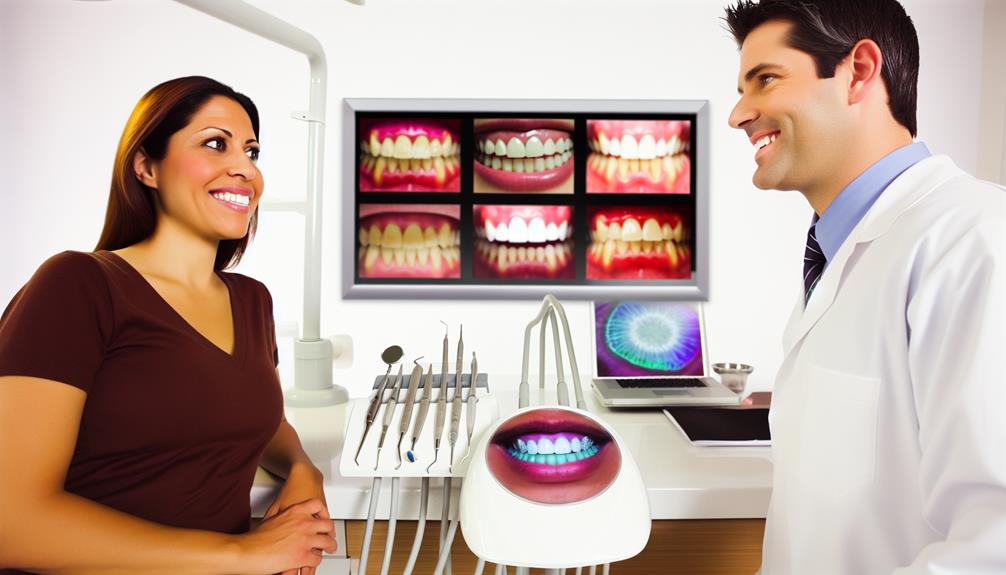
Weighing the benefits against the costs is essential when evaluating teeth whitening treatments, particularly in-office procedures that often require a considerable financial investment. The decision to proceed with these treatments should not only be based on immediate results but also on the long-term effects and personal satisfaction they may yield.
Here are three key factors to assess:
- Durability of Results: In-office whitening can provide more immediate and longer-lasting results compared to over-the-counter options, making it a potentially worthwhile investment.
- Professional Oversight: Treatments performed by dental professionals guarantee safety and effectiveness, which can mitigate risks of adverse effects and enhance personal satisfaction with the outcome.
- Boost in Confidence: A brighter smile can greatly improve self-esteem and social interactions, contributing to overall well-being and personal satisfaction that lasts beyond the initial treatment.
Ultimately, the worthiness of investing in teeth whitening lies in aligning the procedure's outcomes with your personal goals and expectations. By carefully evaluating these aspects, you can make an informed decision that enhances your dental health and personal image.
Frequently Asked Questions
How Long Do Teeth Whitening Results Typically Last?
Teeth whitening results typically last from several months to up to three years, depending on various factors such as the teeth whitening methods used and individual habits. To prolong the effects, incorporating whitening maintenance tips is essential. This includes practicing good oral hygiene, avoiding stain-causing foods and beverages, and using touch-up treatments as recommended. Ultimately, consistent care and informed choices can greatly enhance the longevity of your whitening results.
Can Anyone Get Professional Teeth Whitening Treatment?
Professional teeth whitening treatment is generally accessible to most individuals; however, treatment eligibility may vary based on specific dental conditions. A thorough dental consultation is essential to assess the health of one's teeth and gums, as well as to identify any underlying issues that may affect the whitening process. Patients with certain dental restorations or sensitivities may require alternative options or tailored approaches to achieve ideal results safely and effectively.
Are There Age Restrictions for Teeth Whitening Procedures?
Age limitations for teeth whitening procedures typically exist to guarantee safety and effectiveness. Most dental professionals recommend that individuals be at least 16 years old before undergoing treatment, as younger patients may still have developing teeth. Treatment recommendations may vary based on individual dental health, so a consultation with a dentist is essential. This approach guarantees that patients receive tailored advice that considers both age and overall oral condition, promoting ideal results.
What Should I Do if I Experience Sensitivity After Whitening?
Experiencing sensitivity after whitening is a common concern. For effective sensitivity management, consider using desensitizing toothpaste or fluoride treatments to alleviate discomfort. Additionally, it is advisable to limit exposure to hot, cold, or acidic foods and beverages during the recovery period. Post whitening care is essential; maintain communication with your dental professional to address any ongoing issues and receive tailored advice to guarantee a comfortable and satisfactory outcome following the procedure.
How Can I Maintain My Whitened Teeth Longer?
To maintain the longevity of your whitened teeth, consider implementing effective home remedies and being mindful of your diet's impact. Regularly using baking soda or hydrogen peroxide in moderation can help sustain brightness. Additionally, limit consumption of staining foods and beverages, such as coffee, red wine, and dark berries. Incorporating a diet rich in crunchy vegetables can naturally clean teeth and promote oral health, ultimately preserving your smile's radiance.

